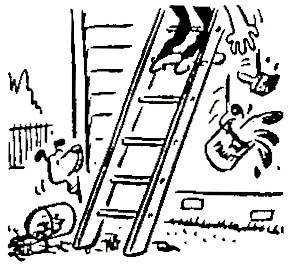| As a person whose first language is not English, I have had to cope with a lot of misunderstandings in daily conversations, to say nothing of the programs 'The Two Ronnies' and 'Allo Allo'. I have spent a considerable length of time sitting in front of a Foolbox, which is a T.V. set, watching various programs to improve my listening skills. In spite of those efforts, still it is not always easy to understand the language. For instance, I laugh when somebody makes a joke in class; often I laugh not because I understand the point, but because I realise that I am the only one who is not laughing at the joke, which is obviously supposed to be funny. That makes me laugh. I suppose there may be some other people in the class who would feel the same way I do. That also makes me laugh. I laugh, anyway, at the 'funny' story. I also have practised using the language as long as situations allow. In many cases my attempts are not successful, and frequently they end up by being explained by the listeners. The other day I was trying to quote a passage from the Gospel. That very verse is "Once the hand is laid on the plough, no one who looks back is fit for the Kingdom of God" (Luke 9:62). And once more I had to realise that there are plenty of exceptions in English language. The trouble was the word 'plough'. I told myself, "Well, there are words like cough, rough and tough, so it will be plough". Having that support to my conviction, it was easy to make a mistake with the word, without a tinge of hesitation. And I said the word plough as "pluff". That's the way my story goes. That serious quotation was greeted with much laughter. It occurred to me, 'Who am I to argue with the language on its exceptions". That newly created word 'pluff' became my nickname for a while. In September I was in Wellington for ten days staying at an Anglican minister's home. There were two dogs in his house. When everybody except me was out, it was difficult to speak to the dogs. One day I wanted to explore the city, so it was necessary to put them out of the house before I locked the door, for otherwise they would have no choice but to use the carpet when they felt nature's call. At first I spoke in my own language as well as sign language to watch their response. At my 'strange' behaviour, they simply 'tailed' as if I was about to do a favour to them - giving food. Then I spoke in English without using sign language, and they obeyed. And at the same time I told myself "Even dogs can understand English!". Well, that was reasonable because in my country dogs can understand my own language. Still I have a little difficulty discerning masculine words from feminine ones. The difference between these words is known to me, but because of the lack of opportunities to use them often they are buried in my 'archives' of language. I am not used to these differences because we don't have that many differences in my own language. Each word is inclusive in my language. King and Queen, host and hostess, actor and actress. Words such as: hero and heroine are more complicated for me, for we use the word heroine not heroess. I don't know whether or not the difference is based upon a so-called patriarchal society. When I use these words, sometimes I realise my mistakes at the same time they come out of my mouth. Because I am using English as my second language, often I have a glimpse of English speakers' ideas behind certain concepts. This may sound complicated - 'ideas' and 'concepts'. Let me explain. I can take the word 'Christianity' as an example. The Penguin Tasman Dictionary explains Christianity as a religion. If it is a religion, we must have 'Christism' for it, because almost every other religions have the end form '-ism' for them. Hinduism, Buddhism, Taoism, and Confucianism. It is interesting that among many terms referring to various religions, Christianity is the only word which ends with the suffix '-ity', as far as I know. Although I have not studied English academically, I can suggest the difference may be revealing a significant fact, the attitude of the people of the period when they started to develop the English word 'Christianity'. Or perhaps Christianity was the only religion known to them. In any case, for them Christianity might be the only perfect and true REALITY, others be simply religions as 'IDEAL IDEAS'. And within Christianity itself there are various '-isms'. Anglicanism, Catholicism, Methodism, Presbyterianism and so on. Likewise, democracy might be regarded as reality and others like socialism and totalitarianism as out of reality, although they have different origins. Why not 'sociocracy'? My journey into the exploration of the English language will take a life-time, and it will still be difficult to understand 'The Two Ronnies'. But I will try. I will never be ashamed of having misunderstandings and making mistakes. Without them it is difficult to pick up the language. Taking that into account, I can even encourage myself to take risks in making mistakes. One cannot learn a language when he or she is scared about making 'terrible' mistakes with the language. And given that the nature of a language is to communicate, I think I am doing 'quite' well. Moreover, who am I to think that I could be a perfect English speaker in a few years? Even for those who are born in an English-speaking society it has taken their life-time so far, to use the language as they do.  | | The Value of Experience | | | There's nothing like experience; it helps you recognize a mistake the second time you make it. |
| 
